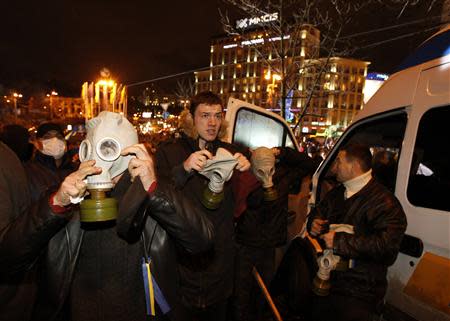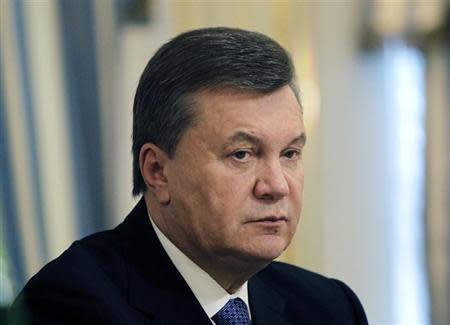Ukraine's Yanukovich defends policy, Tymoshenko declares hunger strike
By Pavel Polityuk KIEV (Reuters) - Ukrainian President Viktor Yanukovich acted on Monday to defuse pro-Europe street protests, saying a decision to suspend moves towards a trade pact with the European Union had been difficult and vowing to bring "European standards" to the country. As some 4,000 demonstrators protested the government's move last Thursday, Yanukovich said in a television address that the decision had been forced by economic necessity. "Today I would like to underline this: there is no alternative to the creation of a society of European standards in Ukraine and my policies on this path always have been, and will continue to be, consistent," he said. Within minutes of his address, fresh clashes broke out involving riot police and protesters just off Kiev's European Square, which is close to government headquarters and where demonstrators have set up a small tent encampment. Special forces used batons and tear gas against a small group of protesters while other demonstrators listened to speakers denouncing government policy and urging greater integration with the European mainstream. The clashes ended after several minutes and the special forces withdrew. Yanukovich's government startled European leaders last Thursday by announcing it was suspending preparations for signing an agreement in Vilnius and it would revive talks with Russia, which had objected to the deal. The government's announcement triggered pro-Europe demonstrations on the streets of the capital, Kiev, and isolated clashes with police. Even as Yanukovich made his TV address, jailed opposition leader Yulia Tymoshenko, who was imprisoned in 2011 after a trial Western governments called politically motivated, declared an "unlimited hunger strike" to push him to sign. "As a sign of unity with you, I declare an unlimited hunger strike with the demand to Yanukovich to sign the association agreement," the 52-year-old Tymoshenko said in a message to the protesters read out in Kiev by her defense lawyer, Serhiy Vlasenko. Before the expected signing in Vilnius, EU envoys had negotiated unsuccessfully for Tymoshenko's release, seeing her as a victim of "selective justice" in the country. (Additional reporting by Natalya Zinets; Writing By Richard Balmforth; Editing by Larry King)

